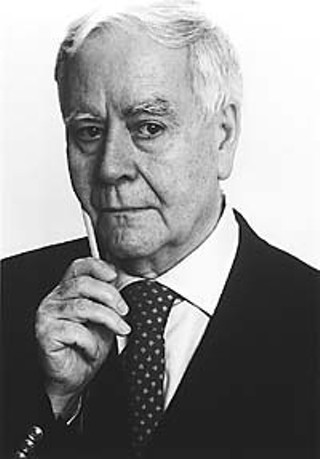The Quiet Man
Hall of Fame inductee Horton Foot
By Robert Faires, Fri., March 7, 2003

"This is Horton."
The voice is gentle, gracious, genuine, with the softened edges of the South and an unhurried air, as if drawn from a less hectic time. And even through telephone wires, it projects a quiet dignity and deeply rooted humanity. In other words, the voice of Horton Foote is full of the same qualities as his plays and films.
Whether it's his Academy Award-winning original screenplay for Tender Mercies or his Pulitzer Prize-winning drama The Young Man From Atlanta, his screen adaptation of To Kill a Mockingbird, which won an Oscar 40 years ago, or his most recent play, The Carpetbagger's Children, which won the American Theatre Critics Association/Steinberg New Play Award last year, the threads that bind the dramas of this native Texan are the courtesy and courage, charity and grace, prized by his characters and hard won in small-town struggles so simply and subtly rendered they seem almost hushed.
Foote found the source for these stories in Wharton, the Southeast Texas town where he was born and reared, and where he lives today, in his boyhood home. Most of his works, which number more than 60 plays and two dozen screenplays and teleplays, are set there and grounded in the people he has known and the stories he has heard throughout his life.
Foote is living proof that any community is fertile with drama that would take a lifetime to tell. His career encompasses the Golden Age of Broadway in the 1940s, the Golden Age of television in the 1950s, studio Hollywood in the 1960s, the regional theatre movement in the 1970s, and the independent film movement of the 1980s.
Today, the veteran writer is of an age when many an honor is coming his way -- a Texas Medal of the Arts, a National Medal of the Arts, induction into the Theater Hall of Fame -- but though he will celebrate his 87th birthday just one week after his induction into the Texas Film Hall of Fame, Horton Foote continues to write and travel the country to see his plays produced. He spoke to the Chronicle from Hartford, where he was observing rehearsals of a 50th anniversary production of his best-known drama, The Trip to Bountiful, which will transfer to Houston's Alley Theatre in April.
Austin Chronicle: Your journey to film started with television. Was that a training ground for you in writing screenplays?
Horton Foote: Not really. Because when I went into it, it was live and it was much nearer to theatre. They had small budgets, so they couldn't have a lot of sets, and they couldn't edit. So what you saw on the performance was what you got, much like an experience in the theatre.
AC: With all the blessings and curses that go along with that.
HF: That's right. The excitement and tensions. I felt that was a wonderful thing, and I was very happy with the way it was, but the way it was didn't last.
AC: So when you began writing screenplays, where did you go to learn that craft?
HF: I didn't. They just threw me into the water and said, "Swim."
AC: That's the hard way to do it.
HF: I don't know. Sometimes I think it's better than being burdened with all these silly rules and restrictions, what you can do, what you can't do. I think every rule is meant to be broken.
AC: You're so associated with To Kill a Mockingbird. How did you feel about coming to screenwriting as an adapter?
HF: At that time in my life, I didn't think about it one way or the other. I resisted reading it because I didn't really want to adapt anything. My wife read it, and she thought I should read it, and she always gave me wise advice, so I read it and liked it a lot. From then on I didn't worry about it. I just looked at it as a project. I met with Harper [Lee], and we certainly saw eye to eye on an approach. I felt very much at home in her town, which was not unlike my town in Texas. I don't take things that I don't feel essentially [right for]. I have, and it's always been a mistake. I won't even tell you what they are, because fortunately they're forgotten.
AC: Did you ever find it odd to think of yourself a screenwriter --
HF: I did for a long while.
AC: -- or is it all just writing?
HF: No, I think there are distinct differences, and one should pay attention to them. I'd hate never to do a film again. I haven't done one in a while because I'm rather picky.
AC: Is that why you also served as producer for Tender Mercies and The Trip to Bountiful? It's a way of getting beyond the Hollywood studio notion of the writer as hired gun.
HF: That is the part I rebel against, that ridiculous clause that we are writers for hire and that the studios own our copyrights and they can dismiss us or bring in five other writers. ... It's a form of slavery. Well-paid slavery at times. Just to be practical, I don't think it serves anybody well. Film is a collaborative art, and you should have everybody working together on the same page, so to speak. ![]()










